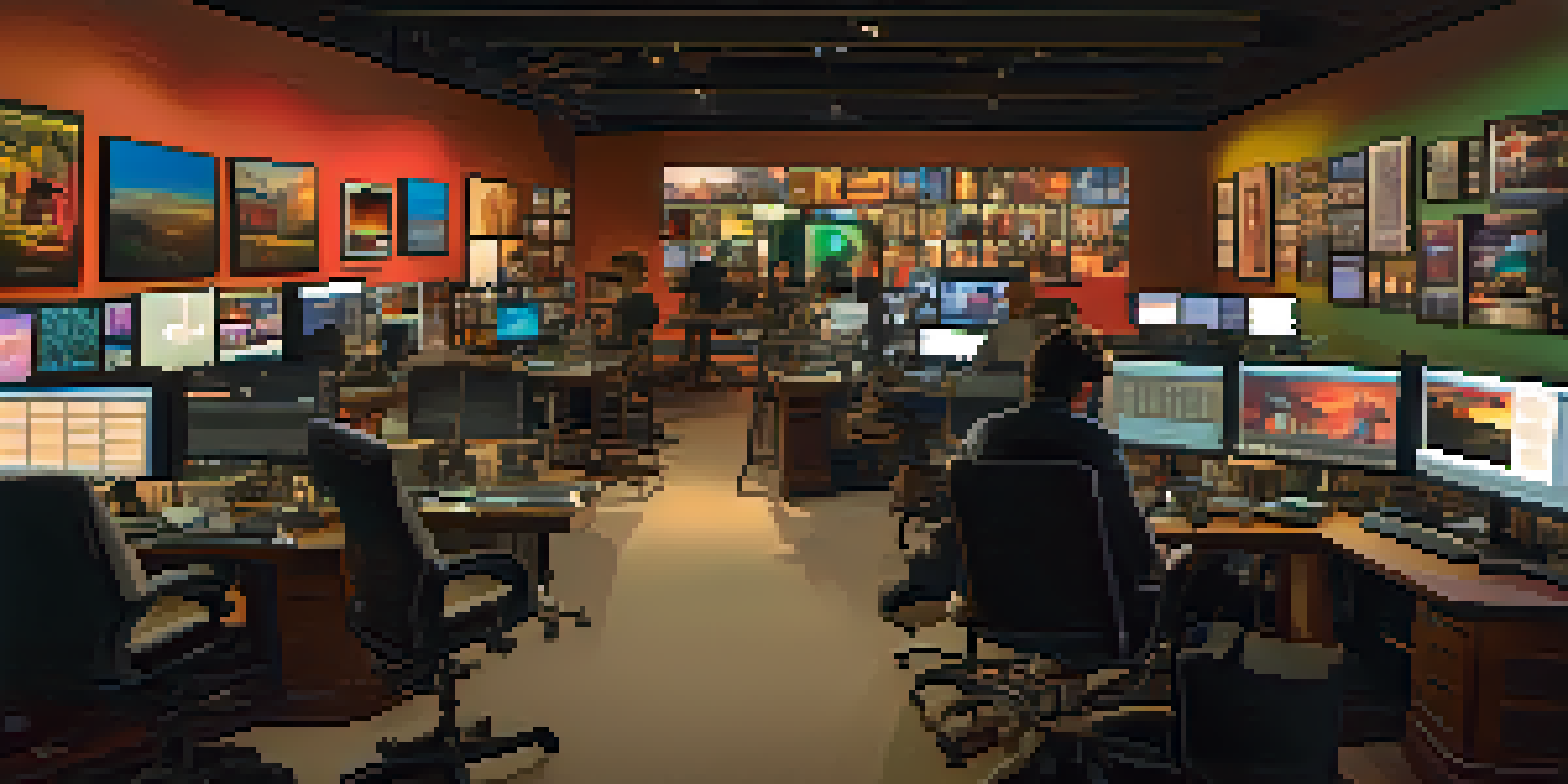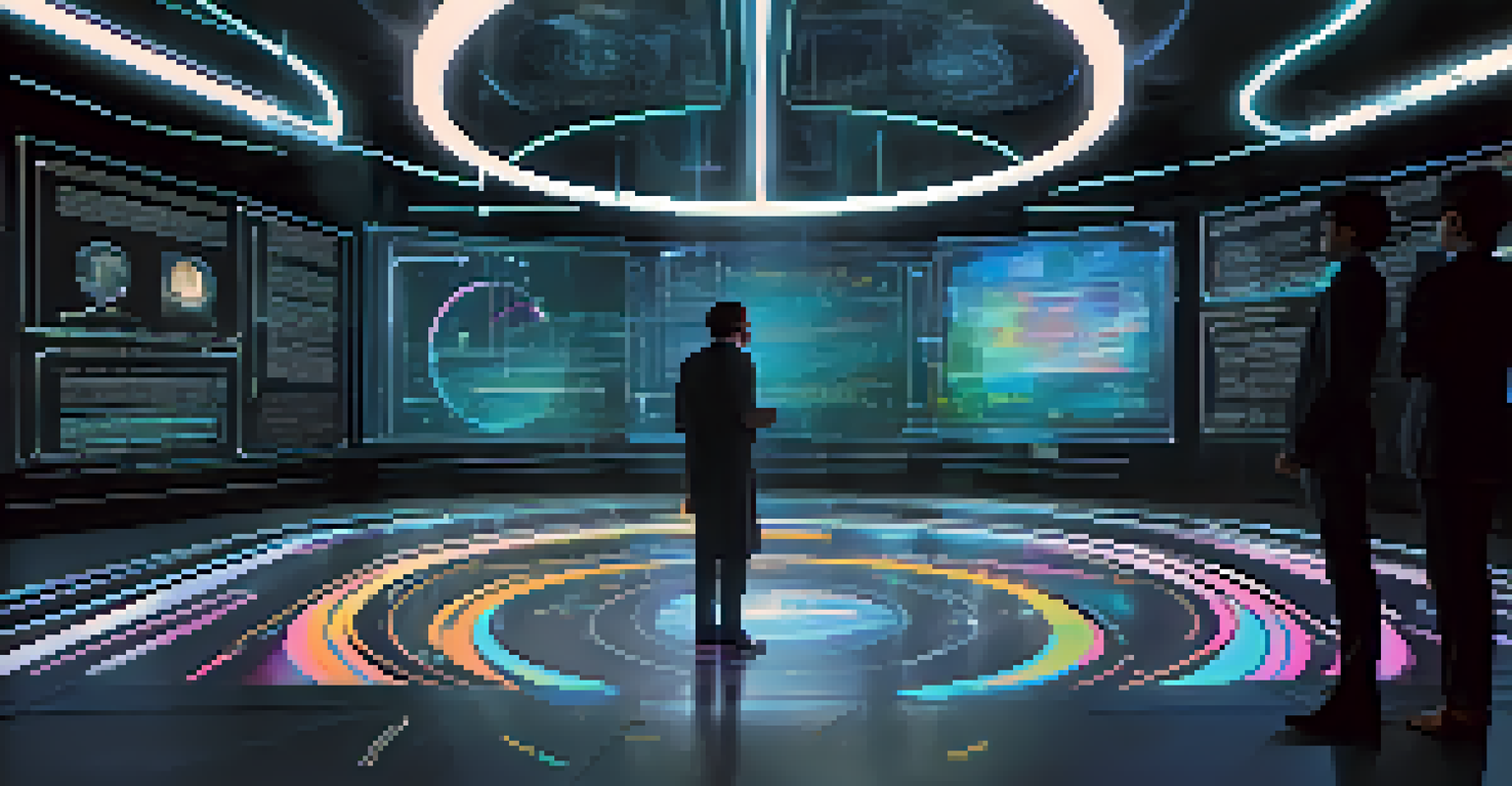Artificial Intelligence in Scriptwriting and Film Editing

The Rise of AI in the Entertainment Industry
Artificial Intelligence is reshaping various industries, and entertainment is no exception. From enhancing visual effects to streamlining production processes, AI is becoming an indispensable tool for filmmakers. The technology not only boosts efficiency but also opens new creative avenues for writers and editors alike.
The best way to predict the future is to create it.
As AI continues to evolve, its applications in scriptwriting and film editing are garnering attention. By analyzing vast datasets, AI can identify trends, suggest narratives, and even generate scripts, making it a valuable collaborator. This shift signifies a growing partnership between human creativity and machine intelligence.
While some may worry about AI replacing human jobs, it’s more about collaboration. Writers and editors can leverage AI tools to enhance their creative processes, allowing them to focus on storytelling while AI handles repetitive tasks. This partnership can lead to richer narratives and more polished films.
AI in Scriptwriting: A New Creative Partner
AI's involvement in scriptwriting is an exciting development for storytellers. Tools like machine learning algorithms can analyze successful scripts and suggest plot points, character arcs, and dialogue. This data-driven approach helps writers brainstorm and refine their ideas more effectively.

For example, some AI platforms use natural language processing to understand tone and genre, offering insights that align with audience preferences. Writers can input their concepts and receive feedback on how to enhance them, sparking new ideas that may not have surfaced otherwise. It's like having a brainstorming buddy that never runs out of energy!
AI Enhances Filmmaking Creativity
AI serves as a valuable tool for filmmakers, streamlining processes and offering data-driven insights that enhance storytelling.
However, while AI can offer valuable suggestions, the human touch remains irreplaceable. Ultimately, storytelling is a deeply human endeavor, and the emotional nuances that resonate with audiences come from personal experiences. AI serves as a tool that enhances creativity, not a replacement for the writer’s unique voice.
Film Editing: Streamlining the Post-Production Process
In film editing, AI is revolutionizing how editors work. By automating mundane tasks like sorting footage or identifying key scenes, AI saves hours of labor. This allows editors to focus more on the artistic aspects of their work, such as pacing and emotional impact.
Artificial Intelligence is the new electricity.
AI algorithms can analyze footage and suggest edits based on various parameters, including continuity and audience engagement. For instance, they can identify the most emotionally charged moments in a scene, helping editors piece together a compelling narrative. This technology acts as a second pair of eyes, ensuring nothing important is overlooked.
Moreover, AI can assist in color correction and sound editing, further simplifying the post-production process. With these capabilities, filmmakers can deliver polished products faster, ultimately enhancing the viewer's experience. It's a prime example of how technology can elevate artistry.
Real-World Examples of AI in Action
Several film studios have already begun to harness the power of AI in their productions. For instance, 20th Century Fox employed an AI system to analyze scripts and predict their box office potential. This innovative approach allowed the studio to make data-informed decisions about which projects to greenlight.
Additionally, companies like IBM have developed AI tools that assist in editing by automatically generating trailers. These AI systems can pull the most exciting clips and create a captivating preview, showcasing the film’s highlights while saving editors time. It's a win-win situation for marketing teams and filmmakers alike.
Collaboration Over Replacement
The partnership between AI and human creatives fosters richer narratives while preserving the irreplaceable human touch in storytelling.
These examples illustrate the growing acceptance of AI in the industry. As technology advances, we can expect even more innovative applications, further bridging the gap between creativity and technology in filmmaking.
Addressing Concerns: AI vs. Human Creativity
As with any technological advancement, the rise of AI in scriptwriting and editing raises valid concerns. Many fear that AI could diminish the role of human creativity, leading to formulaic storytelling. However, it’s crucial to remember that AI functions best as a supportive tool rather than a replacement.
The unique human perspective is irreplaceable when it comes to storytelling. AI might help generate ideas or optimize editing, but it cannot replicate the emotional depth and personal experiences that writers and directors bring to their craft. The creative process thrives on the nuances of human emotion and intuition.
Ultimately, the goal should be to harness AI’s potential while celebrating human creativity. By embracing this partnership, the film industry can leverage the strengths of both AI and human artistry, resulting in richer, more diverse storytelling.
The Future of AI in Film and Scriptwriting
Looking ahead, the potential for AI in film and scriptwriting is expansive. As technology continues to evolve, we can expect even more sophisticated tools that enhance creativity and streamline production. This could lead to entirely new storytelling formats and experiences that we can only imagine today.
Moreover, as AI systems learn from diverse inputs, they can potentially create more inclusive narratives that resonate with a broader audience. By analyzing cultural trends and preferences, AI could help storytellers craft tales that reflect the richness of human experience, fostering a deeper connection with viewers.
Future of AI in Film is Promising
As AI technology evolves, it holds the potential to create more inclusive narratives and transform the filmmaking landscape.
However, the future also calls for a balanced approach. As we embrace AI, it’s important to maintain ethical standards and ensure that technology serves to enhance human creativity, not overshadow it. The film industry stands at the brink of a new era, one where collaboration between humans and machines can lead to extraordinary outcomes.
Conclusion: Embracing a New Era of Creativity
In conclusion, AI is making significant strides in scriptwriting and film editing, offering exciting possibilities for filmmakers. By automating mundane tasks and providing data-driven insights, AI enables writers and editors to focus on what truly matters: storytelling. This synergy between technology and human creativity is reshaping the entertainment landscape.
As we continue to explore the potential of AI, it's essential to embrace it as a partner in creativity rather than a competitor. AI can enhance the storytelling process, allowing filmmakers to push boundaries and tell stories that resonate on deeper levels. With this collaboration, the future of film appears brighter than ever.

Ultimately, the integration of AI in the film industry serves as a reminder of the incredible possibilities that lie ahead. By harnessing technology's power while celebrating the irreplaceable human touch, we can create a new era of filmmaking that captivates and inspires audiences worldwide.